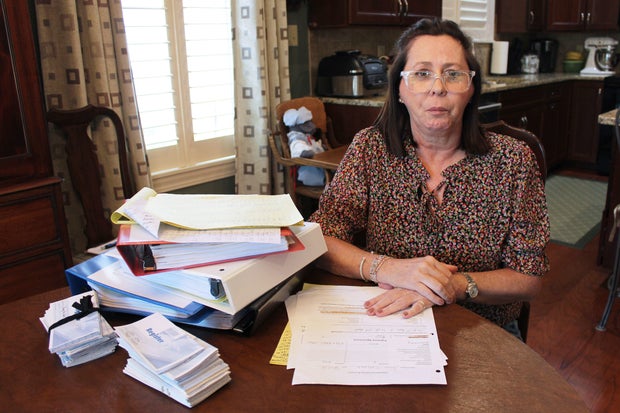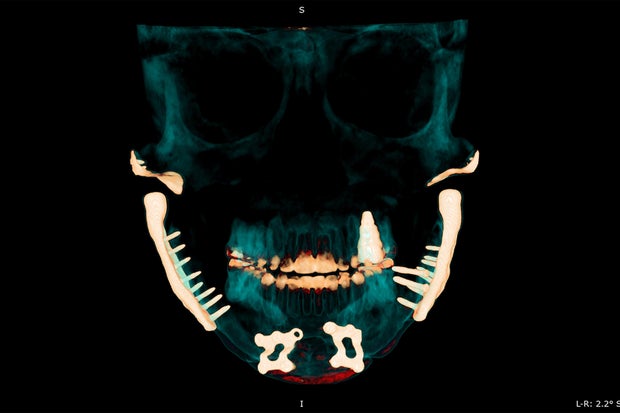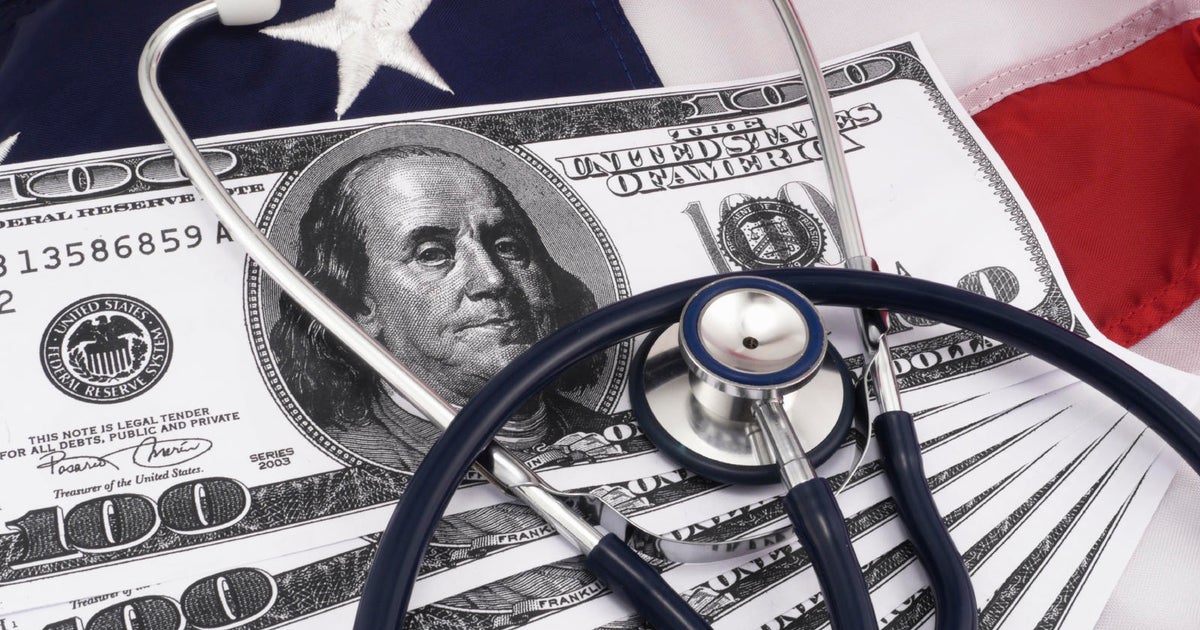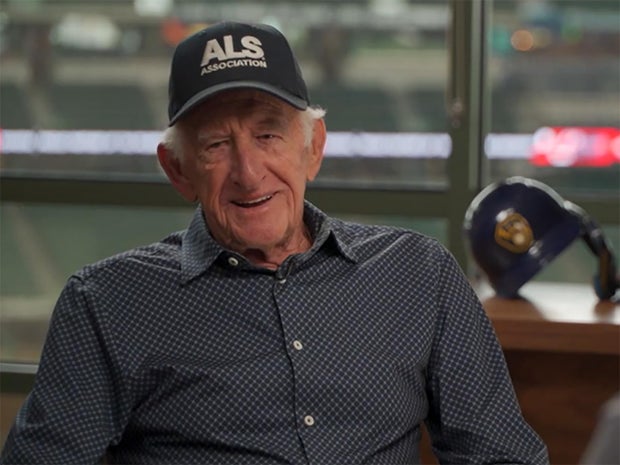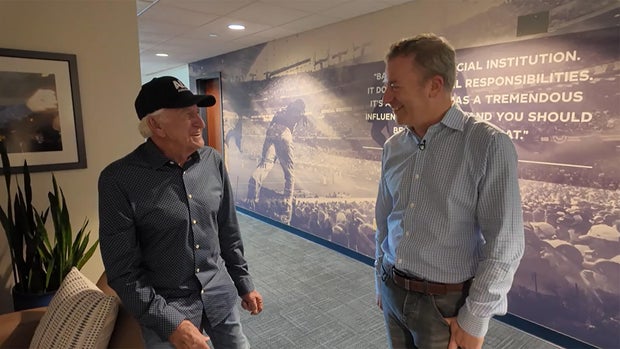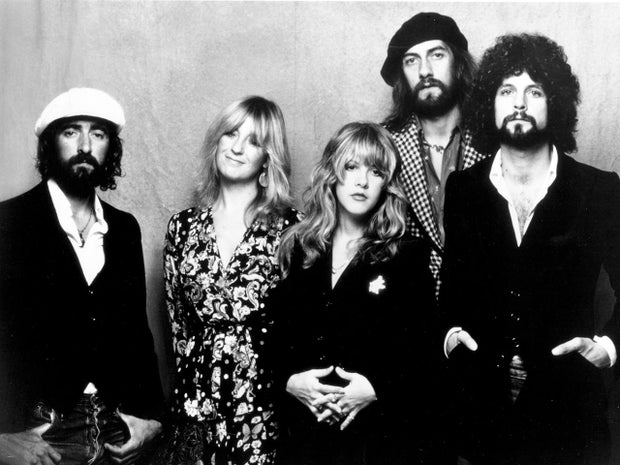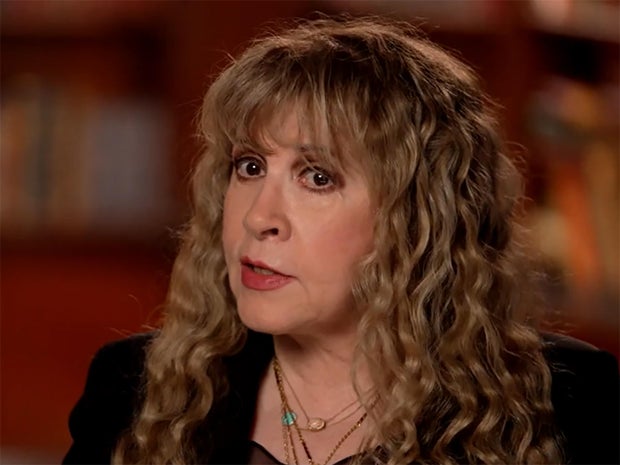CBS News
How TMJ’s out-of-pocket costs drive patients into “a bottomless pit” of debt

Over three decades of relentless pain, Jonna Tallant has tried about every TMJ treatment: mouthguards, six sets of braces, dental crowns and appliances, drugs, physical therapy, Botox, massage, acupuncture, chiropractic care and surgery.
Nothing has helped. Tallant, 51, of Knoxville, Tennessee, said she lives in agony and cannot eat any food that must be chewed. Despite spending a small fortune on treatment, she can barely open her mouth enough to squeeze in a toothbrush.
Tallant estimates she has paid at least $200,000 for TMJ care. She provided medical records showing more than $60,000 in out-of-pocket spending in just the past decade. She has exhausted her savings and borrowed money, she said, and her family sold a plot of land to help pay the bills.
Tallant will need another jaw surgery later this year, which could cost as much as $75,000. Her insurance is unlikely to pay for any of it, she said.
“It’s a bottomless pit,” Tallant said, choking up, as she leafed through a pile of medical records splayed on her dining table. “It has consumed so much of my life that there is not much left.”
Brett Kelman/KFF Health News
Temporomandibular joint disorders, known as TMJ or TMD, cause pain and stiffness in the face and jaw and are believed to afflict as many as 33 million Americans. Scientific studies have found that women experience TMJ disorders two to nine times as often as men, and while minor symptoms may not require treatment, severe symptoms can include disabling pain that makes it challenging to eat, work, talk or sleep.
Despite the commonness of TMJ disorders, treatments are often not covered by medical or dental insurance, leaving patients with out-of-pocket bills that can range from a few hundred dollars to tens of thousands of dollars. Many medical insurers consider TMJ treatment too dental-focused for medical insurance, while dental insurers consider it too medical for dental insurance, leaving patients stuck in a “medical-dental divide” that hinders care and increases cost, according to the National Academies of Science, Engineering, and Medicine.
Worse still, researchers warn that the meager insurance coverage available for TMJ often excludes the safest forms of care while steering patients toward surgery — a riskier and irreversible option that the National Institutes of Health recommends “staying away” from.
Medical scan provided by Lisa Schmidt; image created by Brett Kelman/KFF Health News
Terrie Cowley, a longtime TMJ patient who leads the TMJ Association, an advocacy group, has spoken with patients who refinanced their homes and cashed out retirement accounts to afford the out-of-pocket costs for their care.
“It bankrupts them,” Cowley said. “But it isn’t nearly as horrible as when the treatments go wrong.”
Insurance woes are just one facet of the problems with TMJ care in the United States. In April, a joint investigation by KFF Health News and CBS News found that TMJ disorders have been widely misunderstood by many dentists for decades, so some patients fall into a spiral of ineffective care and futile surgeries that do more harm than good. Dentistry has tried to correct course in recent years with the promising new specialty of orofacial pain, which treats TMJ disorders with a more conservative approach, but these specialists are few and rarely covered by insurance, so their services remain beyond the reach of many patients.
Tony Schwartz, president of the American Board of Orofacial Pain, said the specialty is still fighting for widespread acceptance from insurance companies and some dentists, who cling to “old, debunked theories” that TMJ disorders are caused by misaligned teeth or a bad bite.
“This is the basis for why insurance companies have been so reluctant to, over the years, pay for any treatment,” Schwartz said. “Because there has been so much controversy about what works and what doesn’t work.”
For this article, KFF Health News and CBS News interviewed 10 patients with severe TMJ disorders who have been in treatment for years, if not decades. Almost all the patients described spending thousands of dollars out-of-pocket at every stage of their care, usually because treatment fell outside their medical and dental insurance coverage. Some patients said their medical bills mounted just as debilitating pain forced them to leave jobs or abandon careers. Some underwent expensive TMJ surgeries offered by only a small group of surgeons who generally do not accept insurance.
Kyra Wiedenkeller, 45, of New York state, said she worked as a manager in the music industry, including on “American Idol,” before her “unrelenting pain” became too great.
Wiedenkeller, who is now on disability, said she’s spent at least $100,000 out-of-pocket on TMJ treatment and provided medical documents showing she had been billed for at least that much.
Anna Werner/CBS News
“Every doctor I’ve seen has made me progressively worse,” said Wiedenkeller. “I paid an exorbitant amount of money. I wiped out my 401(k) for these treatments in hopes of getting better time and time again. And just get worse and worse. I feel like there is no end.”
Wiedenkeller’s story echoes findings of the national academies, which conducted a comprehensive study of TMJ in 2020 that included input from more than 110 patients. The study found that TMJ patients are “often harmed” during “overly aggressive” treatment, which frequently falls into a chasm between medical and dental insurance, leaving most bills paid out-of-pocket at costs of up to tens of thousands of dollars.
As an example, the study describes how dental splints — a common TMJ treatment — have been considered to be medical care by some dental insurers and considered dental care by some medical insurance programs, and are “therefore not covered” by either.
And when TMJ is covered by insurance, it tends to exclude “low-risk, effective treatments,” like those used by orofacial pain specialists, but covers “higher-risk” options, like jaw surgery, according to the national academies study. This leads to patients receiving “the care that is best reimbursed, rather than the care that is best,” the study said.
Other researchers have come to the same conclusion.
James Fricton, an orofacial pain specialist who studies the lack of insurance coverage for TMJ care, said that even though surgery is appropriate for few patients, it is the only treatment covered by most insurance plans in most states.
“Patients will assume that insurance companies know what they’re doing,” Fricton said. “If that’s all that’s covered, what do you think they are going to get? Surgery.”
In contrast, insurance coverage appears to be weakest at the other end of the treatment spectrum.
“Orofacial pain,” officially recognized by the American Dental Association in 2020, is now taught in residency programs at at least a dozen U.S. colleges, including the universities of Michigan, Minnesota and North Carolina. The specialty avoids making irreversible changes to the bite or jaw and instead treats TMJ disorders with tools like counseling, dietary changes, medication, physical therapy and removable dental splints. Many TMJ patients can be treated by orofacial pain specialists for a few thousand dollars.
The national academies study describes this approach as one of the few promising options for TMJ patients, citing studies that showed improvement among patients who are taught how to manage their pain. But the national academies also said it is a “particular challenge” that this treatment is “often not considered reimbursable by insurance.”
In separate interviews, six orofacial pain specialists with clinics across the country said insurance coverage for this specialty care is patchy, poor, or nonexistent. Several said their specialty is often absent from dropdown menus on standard insurance forms. Most said the insurance industry had fallen behind on the evolving science of TMJ, missing a chance to help patients and cut costs.
“It’s a no-brainer,” said Jeffrey Okeson, dean of the University of Kentucky’s College of Dentistry. “If I was an insurance person, I’d want to supply $1,000 to a patient to do conservative treatment … instead of $15,000 or $30,000 for surgery. Think of the money that can be saved there.”
Okeson and the other orofacial pain specialists said unreliable insurance coverage has hamstrung the specialty by making it less attractive to the next generation of dentists.
Currently there are fewer than 300 certified orofacial pain specialists in the United States, according to a database maintained by the American Board of Orofacial Pain. At least 20 states have no certified specialists, and eight other states have only one or two.
Deepika Jaiswal, the only certified specialist in Iowa, said some patients with TMJ disorders drive across the state to see her.
However, most of her patients — and many of her fellow dentists — remain unaware of the orofacial pain specialty, Jaiswal said, so insurance companies likely feel little pressure to include it in their coverage.
“People don’t even know around the area that we exist,” said Jaiswal. “When there are more providers providing this service, I think at that point there will be more insurance.”
CBS News producer Nicole Keller contributed to this article.
KFF Health News is a national newsroom that produces in-depth journalism about health issues and is one of the core operating programs at KFF — the independent source for health policy research, polling and journalism.
CBS News
A visit with “Mr. Baseball” Bob Uecker

Ever since Babe Ruth was waddling around the bases, there have been grim predictions about baseball’s future: Time has passed on the national pastime, too leisurely, too bucolic. Last year’s World Series TV ratings, and this season’s batting averages, both hit 50-year lows. Baseball, they say, is dying.
But never mind the current World Series between two of the game’s stalwarts, the New York Yankees and the Los Angeles Dodgers. Want to feel better about baseball’s health? Just go to a Milwaukee Brewers game.
There, in Major League Baseball’s smallest market, cheese curds sweat under floodlights, frozen custard unspools into batting helmets, hometown Miller flows liberally, and on the stadium’s second level is the most authentic Milwaukee touch of all: the broadcaster they call “Mr. Baseball.”
CBS News
In six undistinguished seasons as a catcher in the majors, Bob Uecker never played an inning for the Brewers. But during half a century as the team’s play-by-play announcer, he’s become equal parts mayor and mascot in the city of his birth, all the while declining offers from bigger markets – laying off pitches, as it were.
In the 1980s Yankees owner George Steinbrenner tried to recruit Uecker. “Steinbrenner sent a couple of people out to talk to me about joining the Yankees,” he said, “but I loved Milwaukee. Born and raised here!”
Uecker began his major league career in 1962 with the Milwaukee Braves before the franchise moved to Atlanta. “I was the first player from Milwaukee to ever be signed by the Braves,” he said. “I was also the first Milwaukee native to be sent to the minor leagues by the Braves!”
If Uecker’s on-field inadequacies hampered his playing career, they’ve provided some of his best material in a lengthy and lucrative second career as an actor and comedian. Employing a bone-dry wit, he made more than 40 appearances on Johnny Carson’s “Tonight Show.”
He said, “I did ‘Tonight Shows,’ you know, whenever they wanted. I would leave here on a Sunday afternoon, fly to L.A., do the Monday night show, take a red-eye back here, and be here for Tuesday’s game.”
Johnny Carson: “Give me, fast as you can, all the teams you’ve ever played with.”
Uecker: “Braves, Cardinals, Phillies, and the Braves again. Then, in June, I was with …”
The Carson guest spots led to a series of notable TV commercials, as well as a starring sitcom role, and perhaps most memorably as Harry Doyle, the perpetually blitzed announcer in the “Major League” movies. This past summer, at Milwaukee’s American Family Field, “Harry Doyle Bobblehead Night” brought the Uecker faithful out in force.
Asked his favorite “Bob Uecker line,” he replied, “‘Juuuuust a bit outside.’ That’s where my wife put me a lotta times!”
CBS News
Before serving 16 years as baseball’s commissioner, Bud Selig owned the Brewers, and, in 1971, hired Uecker, misguidedly, as a scout. Selig said it is “legitimately true” that Uecker wasn’t cut out to be a scout. “There were mashed potatoes on the damned scouting report. I couldn’t read it. He couldn’t read it,” he said.
So, Selig moved Uecker to the Brewers’ broadcast booth later that year.
Today there’s even a statue honoring Uecker, where else? In the very last row of the upper deck, behind a pole.
CBS News
But for all the stardom, all the gigs and gags, the late-night-laughs at his own expense, Uecker still fancies himself a player, says Brewers pitcher Brandon Woodruff: “He lets us know about his catching days. He’s one of us. He’s part of the team. And I think that’s why we embrace him so much, is that he’s on this ride with us. And that’s what makes it cool.”
According to Uecker, he has a bond with the players on the field: “I played the game. So, I know how hard it is. I know how tough it is to play this game. The game celebrations, when we win, that’s a big part of it, man, to be able to walk into that clubhouse and be with ’em.”
But baseball is cruel, and in Milwaukee, celebrations are short-lived. Earlier this month, with the Brewers just two outs from winning the National League Wild Card Series, the New York Mets came from behind on a dramatic home run.
On the radio, Uecker didn’t hide the hurt: “I’m tellin’ ya, that one … had some sting on it.”
The Brewers’ first World Series title will have to wait.
There’s speculation that the heartbreaking loss may have marked Uecker’s last game as an announcer. But as his 91st birthday nears, the man they call “Mr. Baseball” told us he doesn’t want to imagine his life without it.
“I don’t know what I would do, you know, with no more. If I think of no more baseball for me, I don’t know what that would be like, you know?” Uecker said. “I got out of high school and I joined the Army. And I signed a baseball contact. That’s been it, really!”
For more info:
Story produced by Robert Marston. Editor: Lauren Barnello.
CBS News
Ralph Fiennes on the provocation of acting

Watch CBS News
Be the first to know
Get browser notifications for breaking news, live events, and exclusive reporting.
CBS News
Stevie Nicks on “The Lighthouse,” her rallying cry for women’s rights

On a trip to New York City earlier this month to appear on “Saturday Night Live” for the first time since 1983, Stevie Nicks said she was scared to death. She said her first reaction when she got the call to appear on “SNL” was, “Absolutely not. Because I was terrified to do it, ’cause it goes out live!”
But she did appear on “SNL,” and her performance of “The Lighthouse” brought down the house.
She says the inspiration for her latest song, a rallying cry for women’s rights, struck a few months after Roe v. Wade was overturned, and it took her less than a day to write the song and record it.
Smith asked, “It takes some courage to step into the waters of the abortion debate. Why take the risk?”
“Because everybody kept saying, ‘Well, somebody has to do something. Somebody has to say something,'” replied Nicks. “And I’m like, ‘Well, I have a platform. I tell a good story. So maybe I should try to do something.’ I was also there. I was, been there, done that.“
Michael Ochs Archives/Getty Images
In the late ’70s, Nicks was on top of the world with the legendary band Fleetwood Mac. She’d broken up with her longtime partner and Fleetwood Mac bandmate Lindsey Buckingham, and she was romantically involved with Don Henley of The Eagles when she found out she was pregnant, and decided that, as a touring musician, being a mother was not in the cards.
In 1979 she terminated the pregnancy. “In my younger life, I’d already decided I didn’t want to have somebody have their feelings hurt all the time, and like, ‘When are you comin’ back?’ ‘Well, I don’t know. I’ll be back when I get back,’ you know?” Nicks said. “And not even having any idea how big that Fleetwood Mac was going to get in the future, you know? And this is, like, super personal and weird, so you know … you can edit this out if necessary.”
“I appreciate your sharing this story though,” said Smith.
“Well, and it’s a good story, too. I tell a good story!” Nicks said. “I got pregnant. And it was like, Why? I have an IUD. I am totally protected. I have a great gynecologist. How come this has happened? What the heck?“
“So you took all the precautions?”
“Yes. And I’m like, This can’t be happening. Fleetwood Mac is three years in. And it’s big. And we’re going into our third album. It was like, Oh no, no, no, no, no, no.“
Nicks said it would have “destroyed” Fleetwood Mac if she had had the baby: “Absolutely, because many reasons. I would’ve, like, tried my best to get through, you know, being in the studio every single day expecting a child. But mostly, having a child with Don Henley would not have gone over big in Fleetwood Mac, with Lindsey and me – we had been broken up for two or three years. It would’ve been a nightmare scenario for me to live through.”
Fleetwood Mac was a collection of stars, but Stevie Nicks was front-and-center. She was the one who wrote the band’s only #1 single in the U.S., “Dreams,” a song that is still a hit today on streaming.
But if “Dreams” is about heartache and vulnerability, Nicks’ new song is just the opposite: it’s about fighting for the same reproductive rights that she had.
Smith asked, “There are people who criticize your choice, condemn your choice. Anything you want to say to them?”
“I’d like to know, so are you just the few guys who are making the decisions for us?” Nicks replied.
CBS News
She said the choice, ultimately, “was mine. And you know what? If people want to be mad at me, be mad at me. I don’t care. Had I made the other choice, had I gone the other way, I’d have been a great mom. I went this way, and I’ve done great.”
Nicks would go on to new heights as a solo artist, becoming the first woman to be inducted into the Rock & Roll Hall of Fame, twice.
Of course Nicks has had her share of heartache as well. The woman she called her musical soulmate, Christine McVie, died in 2022, and Nicks was shattered.
“I wanted to go and step in, sit on her bed, and hold her hand, and sing ‘Touched By An Angel’ to her until I was sure she heard it,” she said. “And I didn’t get to. And I didn’t get to say goodbye to her.”
Nicks now ends her shows with a moving tribute to her best friend. She sings, but can’t bring herself to watch. “We have a really beautiful montage of her and me. I never turn around and look. I can’t, ’cause I’ll start to sob. And if I start to sob, then I won’t be able to finish the song. So, I just don’t look at it.”
CBS News
Nicks says that, although McVie is gone, she feels her presence with her all the time. She wears a necklace containing some of McVie’s ashes. “A little bit of her,” Nicks said. “But as important as that is, she’s in my heart,” she said.
Nicks says she really doesn’t care whether her new song, “The Lighthouse,” is a hit or not; she just wants people to listen. “Poets write what they write, and poets should not be censored. Writers should not be censored. This song should not be censored. It should go out into the world and do what it’s gonna do, maybe change some minds. There is a God, and God gave me this talent to sing and write and dance. So, I’m doing my job.”
For more info:
Story produced by John D’Amelio. Editor: Steven Tyler.
See also:


